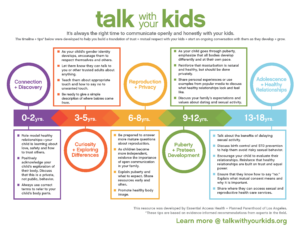 Written by: Edith Lule, Education Manager, Candor Health Education
Written by: Edith Lule, Education Manager, Candor Health Education
Growing up I wish my mother had taken the onus of having certain conversations with me rather than leaning on my older siblings to navigate those “talks.” As a parent, who happens to be rather versed in sex education, I feel confident and comfortable with the conversations I now have with my own two children. In this lies the difference between my mother and I, I believe she really did want to have those conversations with me, she just didn’t feel confident or comfortable doing so.
Most of the prevention field will agree on two things:
- Parents are a protective factor for the well-being of their child(ren).
- Parents are the primary educators of their child, particularly when it comes to a value-driven subject such as sex education.
We assume all parents have the skill set to initiate these conversations. My mother had neither. She had no one to model that conversation for her, the taboo was generational, nor did she receive health education in school. And here I was assuming she was just withholding information.
The following are a collection of websites, videos, books, and guides meant to support parents as we prepare to begin or continue conversations with our kids. This is your cue to clip this article and hang it on the fridge as a courtesy notification for your kids that conversations are coming:
Websites
Amaze.org has a fun collection of animated videos intended for parents of children of all ages.
Ntarupt.org and Talkaboutitdallas.com have a “For Parents” and “Let’s Talk Parents” section, respectively with pointers on when and how to initiate conversations with our teens.
Talkwithyourkids.org offers a timeline (see image) with a user guide, both available in Spanish, to help parents with basics on how to get the conversation started at any age.
Books
“What Makes a Baby” and “Sex is a Funny Word” are geared towards younger children and do a wonderful job of being inclusive and set a foundation for having a conversation on values.
“The Care and Keeping of You” (Part 1 and 2) This book specifically targets puberty changes for females. They do such a good job in each book I wish the authors would release a version focusing on changes of the male body.
Podcast
Six Minute Sex Ed., ran by fellow sex education colleague Kim Cavill, hosts weekly podcasts aimed at helping families talk about sex and other related topics. Her podcasts are tiered either level one which cover the fundamentals, and level two in which she gets into more complex topics.
I’m on a mission to increase parent-child communication across the gamut: sex education, drug education, mental health, consent, safety, etc. Talk in the car, talk at bedtime, talk while sharing fries, talk while taking a walk, talk for a little, talk for a lot, talk often. It takes practice, it takes time, but most importantly, it takes you.
